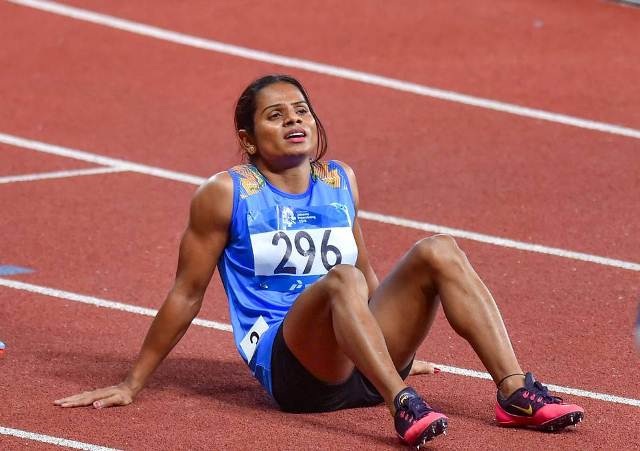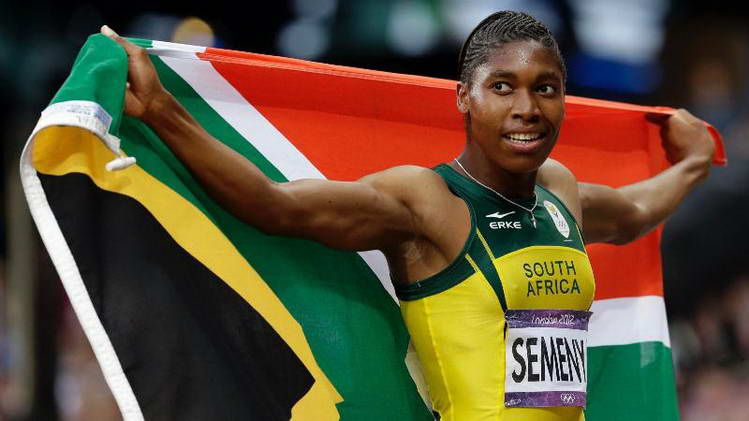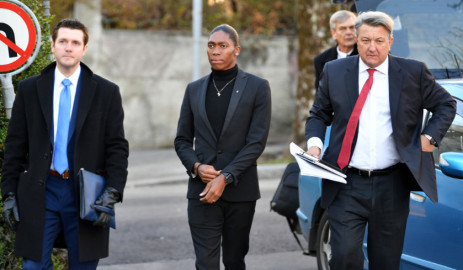Landmark verdict due in Semenya’s case against IAAF
The world’s sports court will decide today(1st may) on South African runner Caster Semenya’s challenge against rules regulating testosterone in female athletes, a verdict expected to have a profound impact on the future of women’s sport.
Semenya, a double Olympic champion, is fighting regulations imposed by the International Association of Athletics Federations (IAAF) that compel “hyperandrogenic” athletes — or those with “differences of sexual development” (DSD) — to lower their testosterone levels if they wish to compete as women.
The IAAF says the rules are essential to preserve a level playing field and ensure that all female athletes can see “a path to success”.
But Semenya’s cause has earned widespread support, including from a global coalition of nations and scientific experts who argue that testosterone is an arbitrary and unfair measure for determining gender.
The Court of Arbitration for Sport in Lausanne, Switzerland heard a week of arguments in the case in February.
Semenya, who has dominated over 800m in the last decade, has remained largely silent during the legal battle.
But scores of others have vocally rallied behind her.
In a rare intrusion into the world of sport, the United Nations Human Rights Council adopted a resolution last month branding the IAAF rules “unnecessary, humiliating and harmful”.
With unanimous support from the council’s 47 member-states representing every continent, the resolution marked a stunning rebuke for the IAAF.
But her most fervent support has come from her native South Africa, where the government has accused the IAAF of seeking to violate women’s bodies.
Experts have meanwhile argued that barring certain women from competition due to naturally high testosterone levels would be like excluding basketball players because they are too tall.
Multiple scientists have noted that achieving excellence in sport is a combination of training, commitment as well as genetics and that barring people from competition over a single genetic factor has no scientific basis.
Sheree Bekker, a research fellow at the University of Bath, has argued that the IAAF is making policy based on “binary” definitions of gender that no longer apply.
“It is, therefore, unfair and unethical for the IAAF to make new regulations for women’s sport – to the effect of excluding some women – based on outdated definitions,” she wrote on The Conversation website earlier this month.
– ‘Fair competition’ –
However, the IAAF is not alone, with athletes of the calibre of world marathon record-holder Paula Radcliffe backing the world body.
“It’s a very, very difficult and complex situation and I don’t feel there is an outcome that is perfectly fair to everybody,” the now-retired British runner told AFP last month.
But she said she believed the IAAF “are trying to protect female sport and create fair competition”.
The IAAF rules capping testosterone levels in women athletes at five nanomoles per litre (nmol/L) of blood were instituted in November 2018 but have been suspended pending Wednesday’s verdict.
The IAAF, led by British track champion Sebastian Coe, has maintained that its case is simply about fairness.
DSD athletes with male levels of testosterone “get the same increases in bone and muscle size and strength and increases in haemoglobin that a male gets when they go through puberty,” the federation has said.
Ensuring that all women athletes have female levels of testosterone is therefore necessary “to preserve fair competition”, it added.
Semenya’s testosterone levels are not publicly known, but if the IAAF rules are approved she is likely not the only athlete who will be affected.
The two athletes who finished behind her in the Rio Olympics 800m, Francine Niyonsaba of Burundi and Kenya’s Margaret Wambui, have also faced questions about their testosterone levels.
2008
July 2008
Mokgadi Caster Semenya competes in the 2008 World Junior Championships in Poland and fails to advance passed the heat stage.
October 2008
Semenya wins a gold medal in the 800m at the 2008 Commonwealth Youth Games in India, with a time of 2:04.23.
2009
July 2009
Semenya wins both the 800m and 1,500m races at the 2009 African Junior Championships in Mauritius, with times of 1:56.72 and 4:08.01 respectively. With that run, Semenya made history by breaking the senior and junior South African records held by Zelda Pretorius (1:58.85) and Zola Budd (2:00.90), respectively.
August 2009
Semenya wins gold at the World Championships. Her time of 1:55.45 is the fastest of the year. Hours before the race, news leaks that the IAAF had conducted medical tests on her, which leads to her being declared ineligible to compete for 11 months. Later it is revealed that Athletics South Africa asked Semenya to have medical examinations.
- November 2009
SA’s sports ministry says Semenya has reached an agreement with the IAAF to keep her medal and award, while remaining suspended. - December 2009
Top industry magazine Track and Field News votes Semenya the number one women’s 800m runner of the year.
2010
- March 2010
A frustrated Semenya arrives at a national track meeting in Stellenbosch and demands to run. The organisers, respecting the IAAF suspension, refuse. - July 2010
In a short statement, the IAAF announces that Semenya is cleared to compete again against other women – nearly a year after her gold medal in Berlin. - August 2010
Semenya wins the ISTAF meet in Berlin in a time of 1:59.90.
2011
- September 2011
Semenya (likely while taking hormone medication) wins silver in the 800m at the World Championships in Daegu, South Korea, behind Russia’s Mariya Savinova. After a difficult 2010, Semenya makes a modest return, only running 1:58.61 at the Bislett Games before the World Championships.
2012
- July 2012
Semenya is selected as South Africa’s flag bearer at the opening ceremony of the Summer Olympics in London. She wins a silver medal in the women’s 800m, with a time of 1:57.23 seconds.
- November 2012
Semenya is awarded South African Sportswoman of the Year at the SA Sports Awards in Sun City.
2014
During 2014, Semenya’s best time is 2:20.66, seven seconds slower than her personal best at the 2009 World Champs. She fails to qualify for the final of the 2015 World Championships, finishing last in her semi-final.
- April 2014
Semenya receives the bronze Order of Ikhamanga as part of Freedom Day festivities.
2015
- July 2015
Indian runner Dutee Chand opens up about her hyperandrogenism and challenges the IAAF on rules that limit women’s naturally-occurring testosterone. She wins a temporary order, and the IAAF was told to drop the rules regulating testosterone. The CAS rules that there is a lack of evidence provided that testosterone increased female athletic performance and notified the IAAF that it had two years to provide the evidence.

- November 2015
The World Anti-Doping Agency recommends Savinova and four other Russian athletes be given a lifetime ban for doping violations at the Olympics. On 10 February 2017, the CAS disqualifies Savinova’s results backdated to July 2010. Semenya’s silver is upgraded to gold.
2016
- April 2016
Semenya becomes the first person to win all three of the 400m, 800m, and 1500m titles at the South African National Championships – all within a nearly four-hour span of each other. - July 2016
She sets a new national record for 800m of 1:55:33. - August 2016
Semenya wins the gold medal in the women’s 800m at the Rio Olympics with a time of 1:55.28.
- September 2016
Semenya sets a new personal best for the 400m of 50:40 at the 2016 Memorial Van Damme track and field meet in Brussels.
2017
- August 2017
Semenya wins the bronze medal in the 1,500m at the 2017 World Championships in London. She also wins gold in the women’s 800m.
2018
- April 2018
The IAAF announces new rules that require athletes with hyperandrogenism to take medication to lower their testosterone levels, effective November 2018. The changes only apply to athletes competing in the 400m, 800m, and 1,500m. Many observers think the rule change was designed specifically to target Semenya.
2019
- February 2019
Semenya goes to the Court of Arbitration for Sport (CAS) in Lausanne to challenge the IAAF’s proposed rules forcing “hyper-androgynous” athletes to lower their testosterone. South Africa’s Parliament threw its weight behind Semenya. MPs from across the political spectrum wore black golf T-shirts with messages of support including “we say NO to stigmatisation of women in sport”, and “we oppose subtle hatred”. 
- March 2019
The CAS delays its ruling until April because both sides had filed additional material since the hearing in February. The United Nations Human Rights Council (UNHRC) adopts a resolution tabled by South Africa to defend athlete Semenya’s rights to participate in sport.
Semenya is honoured on Time‘s list of the ‘100 most influential people of 2019’. - April 2019
Semenya wins the 1,500m and 5,000m races at the 2019 ASA Senior Track & Field and Combined Events Championships at the Germiston Athletics Stadium.
(AFP and Iafrica)



